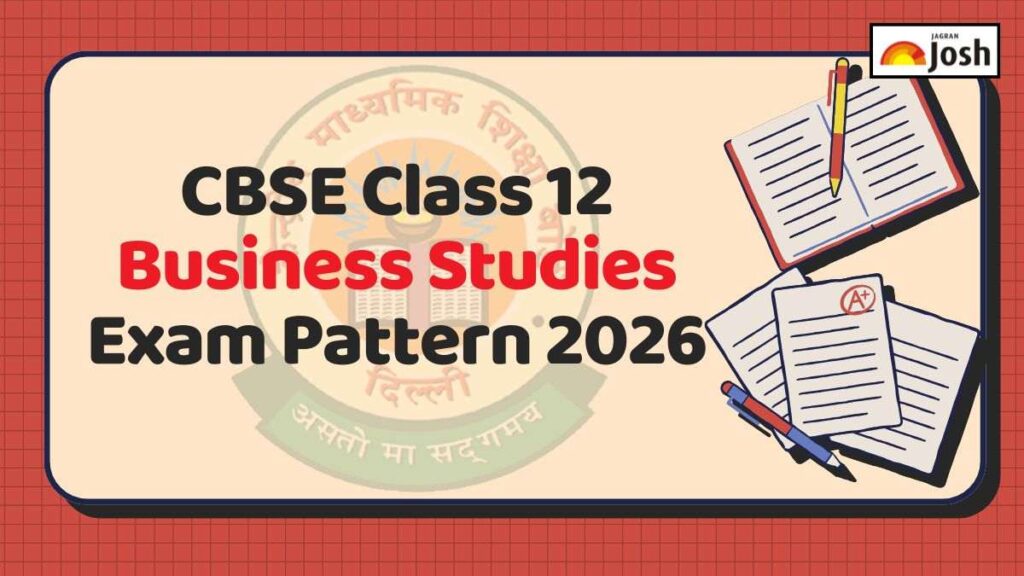CBSE Class 12 Business Studies Exam Pattern and Marking Scheme 2026: The Central Board of Secondary Education (CBSE) will conduct the Class 12 Business Studies board examination in 2026 based on a specific, structured pattern. The subject is evaluated through an 80-mark Theory paper and a mandatory 20-mark Project Work/Practical assessment, totaling 100 marks. This framework is essential for students to understand, as the exam assesses not only conceptual knowledge of management and finance but also critical thinking, case study analysis, and the application of business principles, with a strong emphasis on competency-based evaluation.
The theory paper is structured around the two core sections: Part A: Principles and Functions of Management and Part B: Business Finance and Marketing. The paper includes a diverse range of questions, such as Multiple Choice Questions (MCQs), Case Study-Based Questions (CBQs), Short Answer, and Long Answer (6 marks), designed to test different cognitive abilities. Students must strategically align their preparation with the unit-wise weightage and the specific breakdown of question types to master the curriculum and maximize their overall score in the final board examination.
CBSE Class 12 Exam Pattern 2026: Key Highlights
Check the below table to get the key pointers of CBSE Class 12 Exam Pattern:
|
Board |
Central Board of Secondary Education (CBSE) |
|
Class |
12 |
|
Streams |
Science, Commerce, Arts/Humanities |
|
Question Paper Pattern |
|
|
Duration |
3 hours |
|
Mode of Exam |
Offline, Pen and Paper |
|
Number of subjects |
5 or 6 (as elected by the student) |
|
Maximum Marks |
100 (theory + practical)
|
|
Each Subject Passing Marks |
33% |
|
Passing marks for the overall exam |
Aggregate 33% |
|
Official Website |
CBSE Class 12 Business Studies: Chapter-Wise Exam Pattern & Marking Scheme
The table outlines the CBSE 12th Business Studies exam pattern:
|
Subject Code |
054 |
|
Time |
3 Hours |
|
Max Marks |
80 |
|
Number of Questions |
34 |
|
Number of Sections/Parts |
No Sections |
|
1 Mark Questions (No Choices) |
20 |
|
3 Mark Questions – 50-75 words answer (Choices Will be given in two) |
4 |
|
4 Mark Questions – 150 words answers (Choices Will be given in two) |
6 |
|
6 Mark Questions – 200 words answers (Choices Will be given in two) |
4 |
CBSE Class 12 Business Studies Exam Pattern 2026: Unit-wise Marks distribution
The following table mentions the weightage distribution across various themes of CBSE Class 12 Business Studies curriculum for the upcoming board exam:
|
Units |
Topic |
Marks |
Part A |
Principles and Functions of Management |
|
|
1 |
Nature and Significance of Management |
16 |
|
2 |
Principles of Management |
|
|
3 |
Business Environment |
|
|
4 |
Planning |
14 |
|
5 |
Organising |
|
|
6 |
Staffing |
20 |
|
7 |
Directing |
|
|
8 |
Controlling |
|
Part B |
Business Finance and Marketing |
|
|
9 |
Financial Management |
15 |
|
10 |
Financial Markets |
|
|
11 |
Marketing Management |
15 |
|
12 |
Consumer Protection |
|
|
TOTAL |
80 |
|
|
Part C |
Project Work (one) |
20 |
Weightage Distribution for Business Studies Practical
Class 12 Business Studies Chapter-Wise Weightage for Practical Exam
Evaluation Scheme |
Marks Distribution |
|
Initiative, cooperativeness and participation |
2 marks |
|
Creativity in presentation |
2 marks |
|
Content, observation and research work |
4 marks |
|
Analysis of situations |
4 marks |
|
Viva |
8 marks |
|
Total Weightage |
20 marks |
CBSE Class 12 Business Studies 2026: Typology of Exam Pattern
Check the table below to know the CBSE Class 12 Business Studies 2026 typology of Exam Question Paper:
|
S. No. |
Typology of Questions |
Marks |
Percentage in the paper |
|
1 |
Remembering and Understanding: Exhibit memory of previously learned material by recalling facts, terms, basic concepts, and answers. Demonstrate understanding of facts and ideas by organizing, comparing, translating, interpreting, giving descriptions, and stating main ideas. |
44 |
55% |
|
2 |
Applying: Solve problems to new situations by applying acquired knowledge, facts, techniques and rules in a different way. |
19 |
23.75% |
|
3 |
Analysing, Evaluating and Creating: Examine and break information into parts by identifying motives or causes. Make inferences and find evidence to support generalizations. Present and defend opinions by making judgments about information, validity of ideas, or quality of work based on a set of criteria. Compile information together in a different way by combining elements in a new pattern or proposing alternative solutions. |
17 |
21.25% |
|
|
Total |
80 |
100% |
A thorough understanding of the CBSE Class 12 Business Studies Exam Pattern and the precise unit-wise weightage for 2026 is the foundation of a winning study strategy. By focusing preparation time on the high-weightage units, practice to the increased percentage of Competency-Based Questions, students can ensure they cover the syllabus effectively and are well-prepared for the final board examination.
Also Check:

